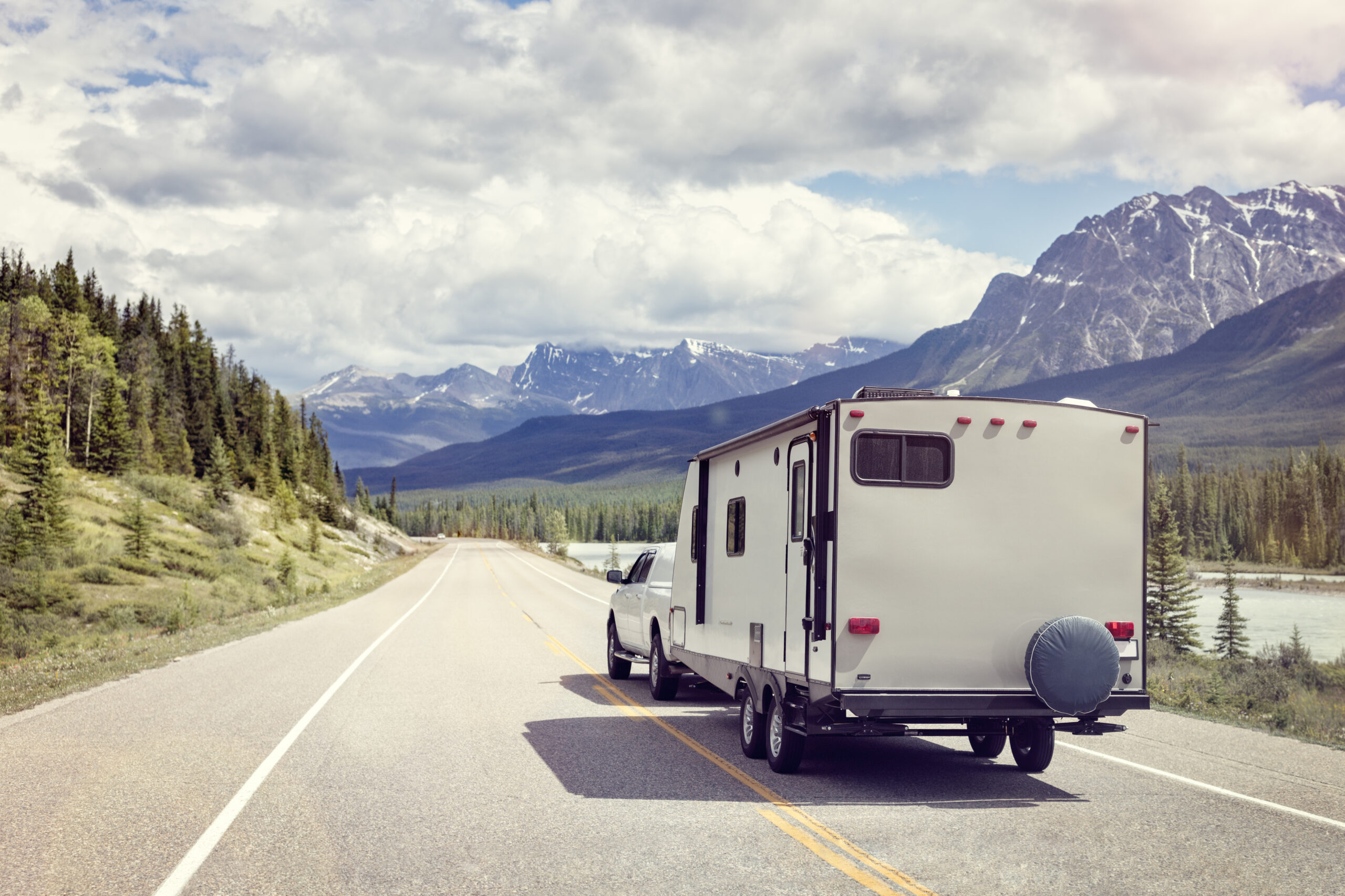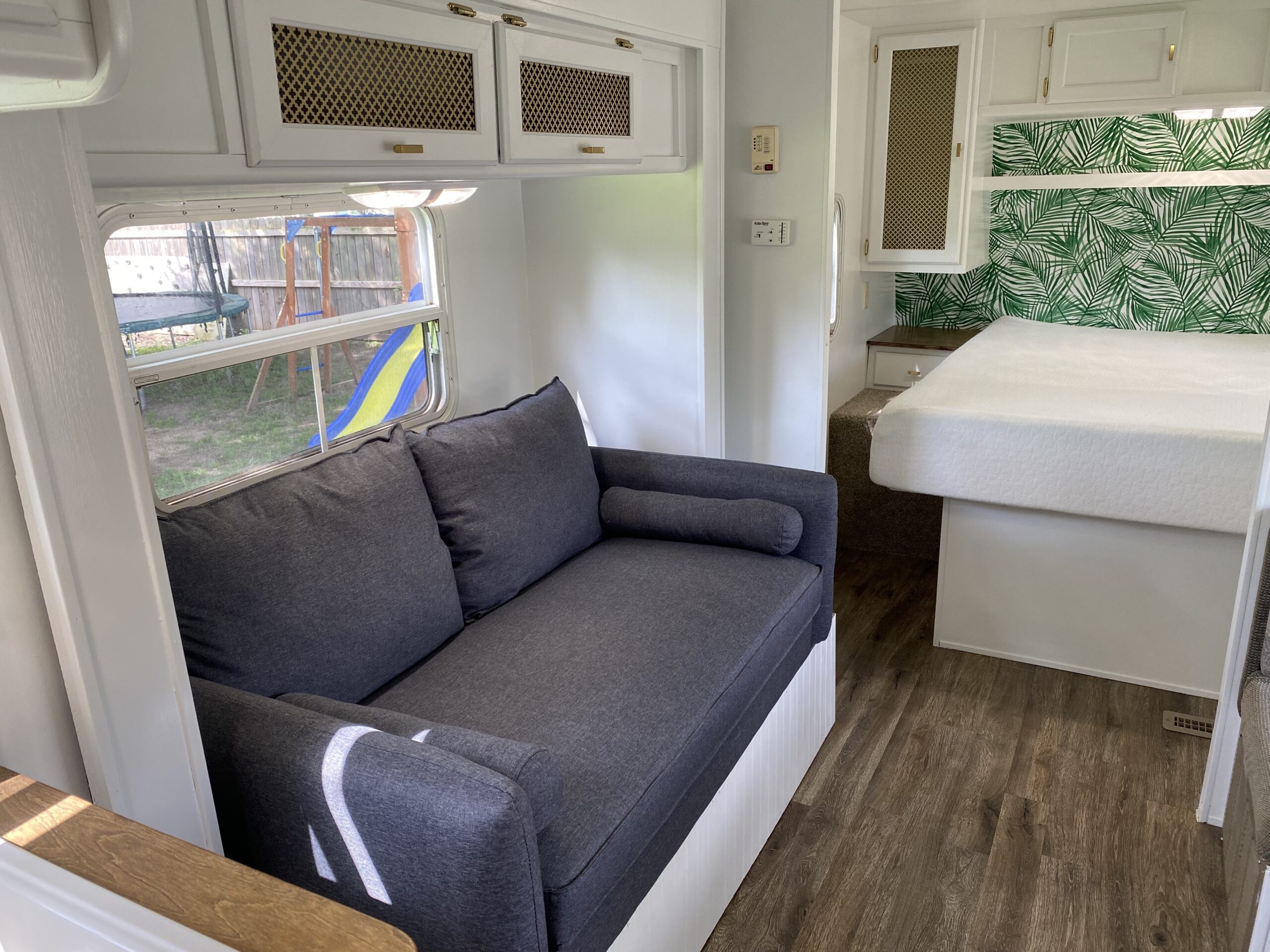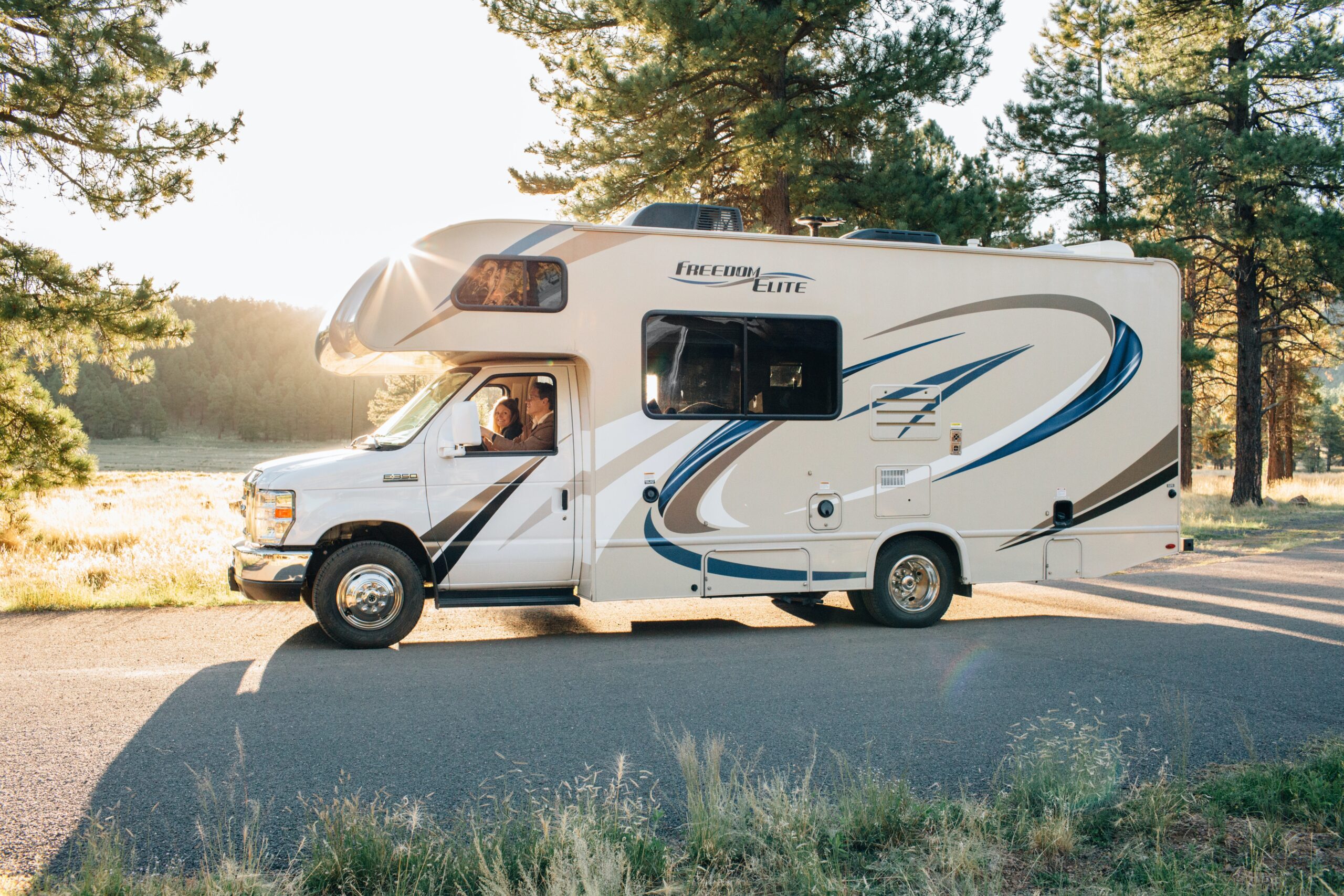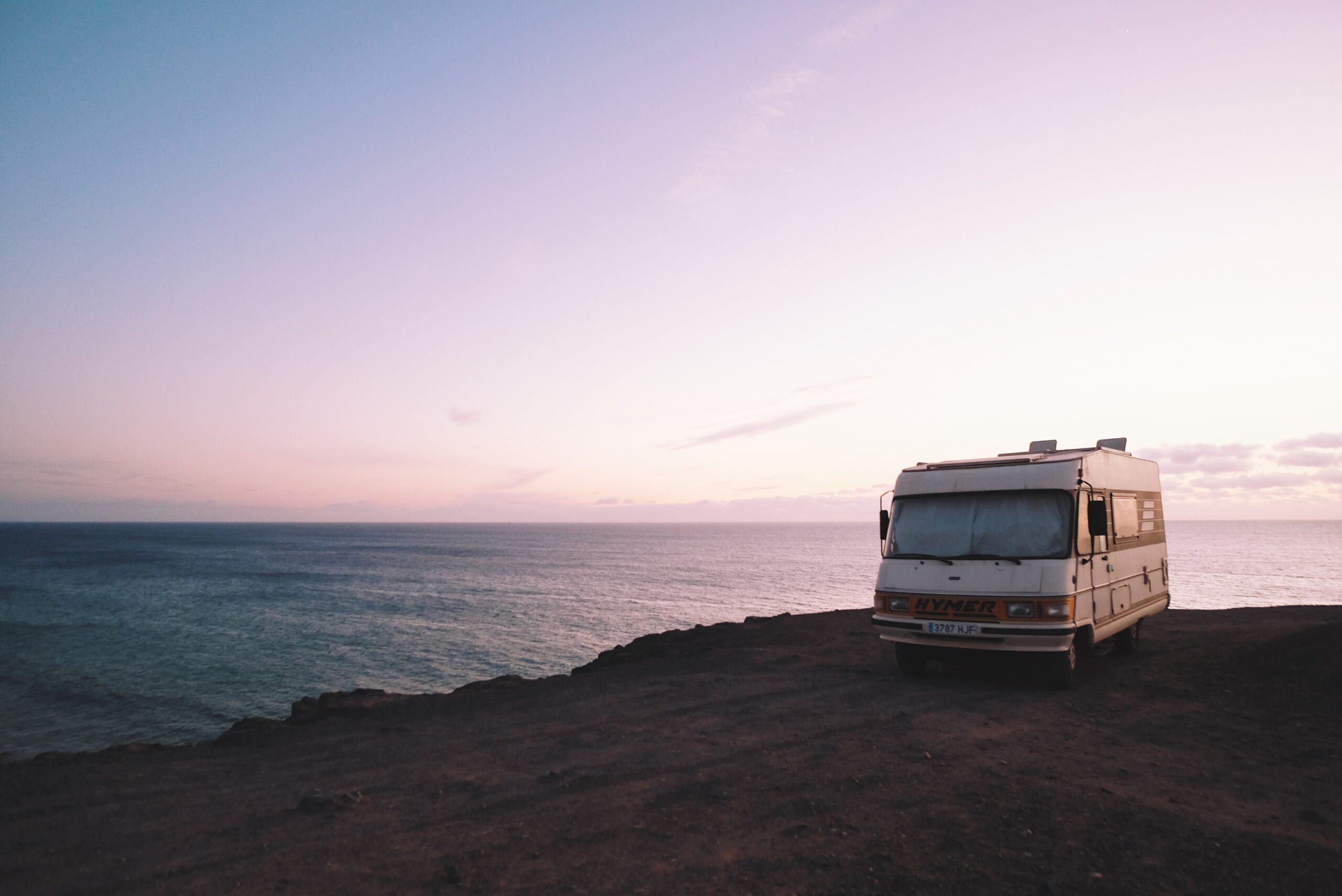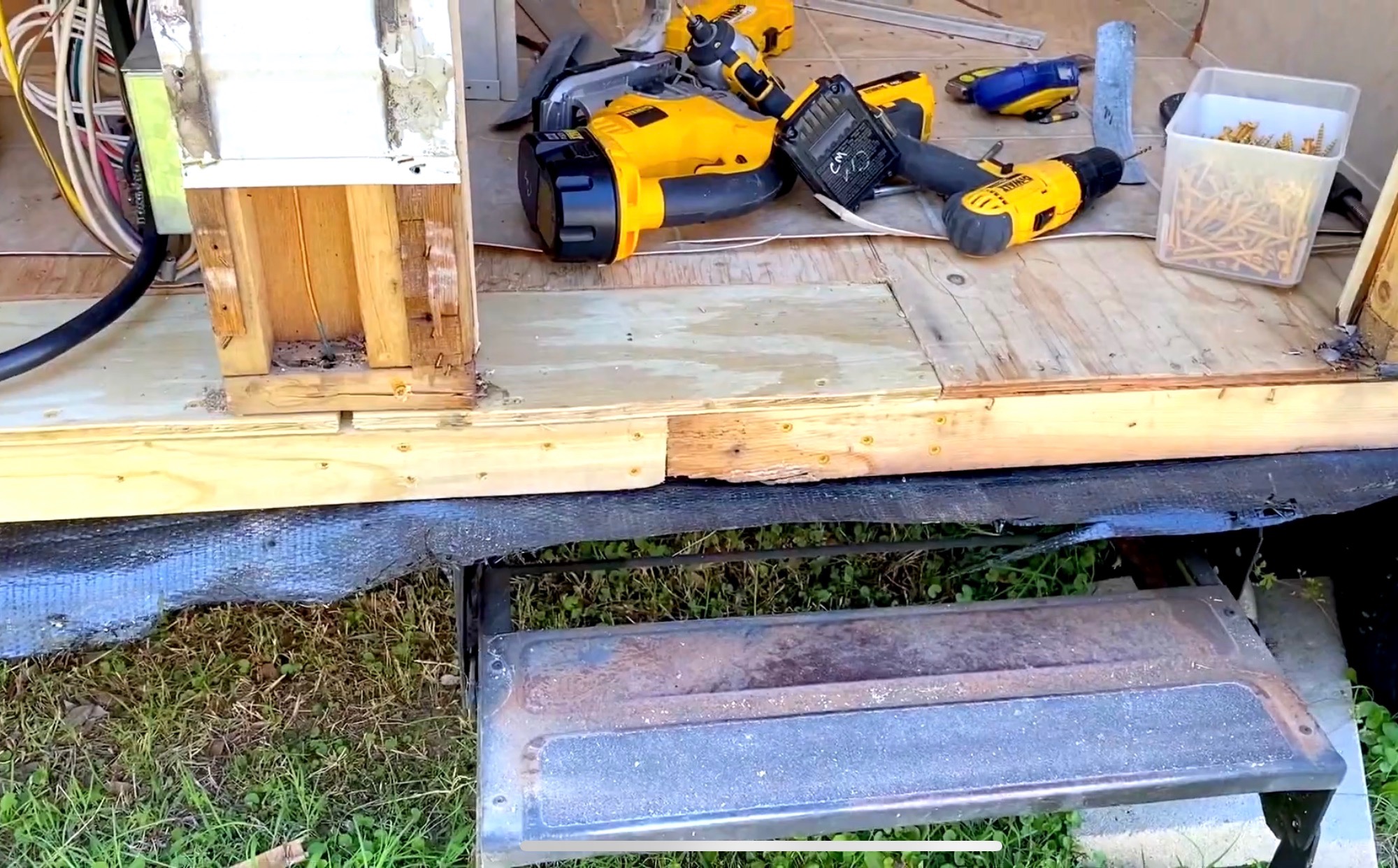A camper trailer is a unit that you attach to the back of your vehicle via a hitch and pull behind you as you chug along towards your destination. In other words, they trail behind your vehicle. Should they be attached correctly, they will follow along nicely, brake when you brake, and keep on rollin’ when it is time to go fast.
And if you cannot stop thinking about the unicycle thing, here you go.
Motorized vs. Towable RVs

There are countless ways to travel by road based on your style and budget. One important distinction is between motorized and towable recreational vehicles (RVs).
Motorized RVs are what they sound like. They can be driven independently and do not need another vehicle to function. Although, you will often see motorized RVs towing a secondary vehicle for greater freedom and flexibility at the destination.
On the other hand, towable RVs are the bread and butter of the recreational vehicle industry. They became popular sometime in the ‘50s and are still thriving to this day. They attach to your vehicle and roll along merrily, waiting to reach their destination and transform into a comfortable living space for your weekend getaway.
Some Basic Considerations
Camper trailers come in all shapes and sizes. Everything from massive trailers with multiple slide-outs, to more petite teardrop-trailers that simply offer additional storage and a place to sleep.
If you’re interested in a camper trailer, perhaps the most important thing to think about first is what vehicle you plan on using to tow the thing. Every car, and their respective hitches, have load limits. The bigger the car (or truck) the wider array of trailers it will be able to pull. And visa versa.
You will also want to consider your travel or camping style. Are you looking to tug along an entire home on wheels? Or is a small pod for sleeping and storage sufficient? Maybe something in between?
A third important consideration is where you plan to travel. Hauling a camper trailer limits your freedom with regards to the types of roads you can travel on and the places they will take you.
Paved roads are preferred but some dirt and gravel would be fine. If, however, you fancy yourself some 4×4 adventure, and very remote campgrounds, a camper trailer would not suit you.
Quick Statistics for Camper Trailers
In order to start thinking about the wide range of camper trailers, here are some helpful (rough) statistics:
- Length: anywhere from 13 to 39 feet
- Sleeping Capacity: generally up to 10 people
- Slide-Outs: up to 3
- Vehicle Weight Range: 2,000 to 11,000 pounds
- Price Range: $15,000 to $150,000
It’s important to remember that these stats are just approximate ranges. Each trailer buying experience will be different based on what’s available in the local market.
Types of Camper Trailers or RV’s
In general, there are 5 types of camper trailers on the market. Here is a quick rundown of each one and some of their pros and cons.
Folding or Pop-Up Trailers

Folding and/or pop-up trailers are relatively self explanatory. While in tow, they are compacted into a smaller, more aero-dynamic package. When you reach your site, they can be expanded manually or electronically. Most have tent-like sides while others have a harder shell to provide more durability and insulation.
Pros
- Least expensive option
- Most Lightweight
- Better miles per gallon
Cons
- Lack certain luxuries, like a bathroom
- Limited insulation
- Limited durability
- Tent-sided trailers may be restricted at certain destinations due to the presence of wildlife like bears
Travel Trailers

Travel trailers are probably the most common and widely sold type of camper trailer. The iconic Airstream is a perfect example. They have solid walls, can be large or small, and are like a little house on wheels.
Pros
- Tons of different shapes, sizes and models to fit your budget and camping style
- Rigid walls provide insulation
- Very little set up time
Cons
- A suitable vehicle (often a larger one) is required
- Requires learning new skills for driving and hauling
- Campsite limitation based on size
Expandable Trailers

Similar to the classic camper trailer is the expandable trailer. I’m going to lump hybrids camper trailers in here as well. The main difference is that expandable trailers include sections of the rig that expand, or slide-out, in order to provide extra space when you reach your destination.
Pros
- Extra sleeping and living space
- Can be towed with a variety of vehicles
Cons
- More setup time
- Often larger and heavier which can decrease fuel economy
- Campsite limitations due to your slide-outs
5th Wheel Trailers

Have a pickup truck? Great! This type of trailer is specifically designed to be hauled out of the bed of a pickup. The front of the trailer extends over the bed and slides into an installed hitch in the bed of the truck.
Pros
- More living space (the space in the front of the trailer is often a dedicated bedroom)
- More stable towing
- Can stand alone without the tow vehicle
Cons
- Often necessitates a heavy duty pickup truck
- The space leftover in the bed of the truck is limited
- Larger and heavier
Toy Haulers
Toy haulers, also known as “sport utility trailers”, are popular amongst those who travel with motorcycles, ATVs or other types of toys. The rear portion of the trailer functions as a garage.
This is made possible by furniture the folds flat against the walls and bunk beds that can be elevated towards the ceiling. The back wall opens and closes, functioning as a ramp to load and unload the stored vehicles.
Pros
- Tons of storage
- Versatile garage space
- Ramp can function as a porch
Cons
- Less living space
- Additional setup and break down
- Loading the trailer with dirt bikes and dune buggies adds weight
Camper Trailer FAQs
Is towing a camper trailer safe?
The short answer is, yes. So long as the trailer is connected to the hitch properly and is being towed with a capable vehicle, traveling with a camper trailer is very safe. With that said, driving any vehicle, especially in less than ideal weather, can pose danger.
Do camper trailers come with a generator?
Some camper trailers will come with an equipped generator. Smaller models may not. However, buying a generator aftermarket is very simple to do. If you’re curious about how to provide power to your RV trailer, check out this page.
How do you go to the bathroom in a trailer?
Larger camper trailers will come with a full bathroom— toilet, tub, and shower. For smaller trailers, some improvisation will be necessary when nature calls. Take a peek at this page to learn about RV bathrooms.
Are camper trailers suitable for hot and cold weather?
Yes, most camper trailers are suitable for most types of weather. That being said, some are more insulated than others. For example, a tent-sided trailer might be nice when it’s hot, but not if it’s icy cold. Camper trailers, with rigid walls, can be equipped with AC units and heaters in order to keep the temperature comfortable on the inside no matter the weather on the outside.
“Buy Your Third Trailer First”
As you spend more time involved in the camper trailer industry, you might end up hearing this popular saying. It highlights the importance of taking your time to find the right rig.
Sometimes, it takes a person two or three rounds of buying/selling their camper trailer to end up with the trailer they should have had all along.
Like most things in life, every camper trailer you can choose from has its pros and cons. It’s all about figuring where you like to travel, what you enjoy doing when you get there and how you want to arrive.
The bottom line is that you do not want to rush the process. Doing your research and touring different trailers are excellent strategies for learning more. Another great option is renting a certain type of trailer to test out its functionality for your specific travel needs and lifestyle.
Now go forth and travel. Happy towing!

